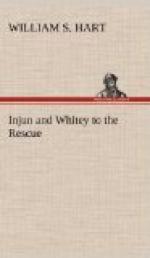And Whitey’s father began to get angry. But Whitey had become a frontier boy, and accustomed to standing his ground in the face of a superior enemy—at least, when he couldn’t run any farther. When he was finally run down, he backed into a corner, lifted his fists to the proper angle, and, in this boyish fighting attitude, said to his big, strong, wonderful dad, “Don’t you hit me!”
If it hadn’t been for his father’s strong sense of humor, Whitey probably would have been in for a sound trimming. As it was, his father paused and looked at him sternly; then his piercing blue eyes began to soften, and signs of his sense of humor began to appear about his mouth. And he turned on his heel, and walked away, leaving Whitey to his grief.
CHAPTER VII
EDUCATION AND OTHER THINGS
Winter dragged coldly by, saddened by the lessons of John Big Moose, and brightened by an occasional hunting trip the boys took to the mountains. Sitting Bull did not seem to justify Whitey’s first idea of him; that he was a magnet for excitement. Apparently Bull was satisfied to lie by the big living-room stove and sleep, except when the boys were going for game. Then he was eager to go.
“That there dog is like some folks,” declared Bill Jordan. “He’s powerful smart, but he’s got a lot o’ false idees ’bout himself. He ain’t built for huntin’ no more’n he is for runnin’. Why don’t you take him along onc’t, an’ show him his mistake?”
So one day when the snow was light, and snowshoes were not needed, Injun and Whitey took Bull to the hills with them, and he was mad with delight. But all he did was to rush excitedly about and frighten the game, except once, when Whitey had a good but hard shot at a rabbit. Then Bull got between Whitey’s legs and tripped him up, so that Whitey missed the shot.
The boys came back without any game, and apparently without convincing Bull that he was no hunter, for the next time they started he was just as eager to go as before.
“You thought he’d be cured of wanting to hunt, but he isn’t,” Whitey said reproachfully to Bill Jordan. “I don’t think he’s so smart, after all.”
“Smart!” exclaimed Bill. “Why, he’s just nachally too clever t’ give up. He’d keep on tryin’ till he did b’come a great hunter.”
This was the usual satisfaction Whitey got out of Bill’s arguments, but Bull went hunting no more.
One of the boys’ other diversions had to do with a Chinaman named Wong Lee. Wong had succeeded the colored man, Slim, as cook at the Bar O. Slim had thought the Montana winter too severe for his miseries, and had gone South for good, and as Wong was a much better cook, no one felt sorry. Wong was placid, industrious, and very amiable, but beneath all this he must have had nerves, as I suppose Chinamen have, in common with other people.
He slept in a shack near the bunk house, and carried his industry so far that at night he would do all the washing that was to be done at the ranch house, for which he was paid extra. And here was the boys’ chance. Injun was like most other boys when it came to mischief, and Whitey taught him the ancient game of tick-tack. In case you don’t know it, I’ll tell you how it’s done.




